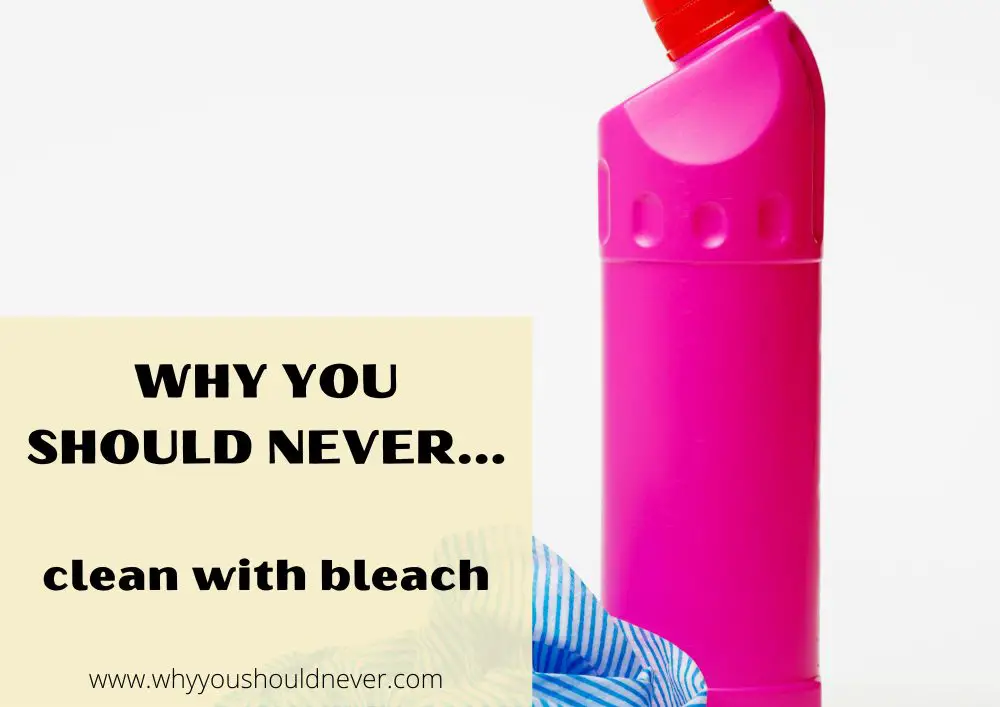![]()
Why You Should Never Clean With Bleach
Bleach is a common household cleaning product that many people use to disinfect surfaces and remove stains. It’s advertised as a powerful cleaning agent that can kill germs and bacteria. It’s cheap, it’s effective, and you can find it everywhere.
We’ve all used it. Whether we wanted to remove a pesky stain on our clothes, sanitize our countertops, or get rid of mold in the bathroom, bleach seemed like the perfect solution. And, in some cases, it is.
However, just because it’s popular doesn’t mean it’s the best or safest option. In fact, using bleach can have some serious negative consequences that you might not be aware of. Let’s explore some of these below.
8 reasons why you shouldn’t clean with bleach
1. It releases toxic fumes
Bleach contains sodium hypochlorite, which can react with other chemicals in your home to create toxic fumes. When bleach is mixed with ammonia or vinegar, for example, it can release chlorine gas, which is extremely dangerous when inhaled.
In fact, exposure to chlorine gas can cause respiratory issues, coughing, wheezing, and even chemical pneumonia.
2. It can cause skin irritation
Bleach is a powerful chemical that can cause skin irritation and even chemical burns if it comes into contact with your skin. This is especially true if you have sensitive skin or if the bleach is not properly diluted.
3. It’s harmful to the environment
When bleach is flushed down the drain, it can harm aquatic life and pollute the environment. Bleach can react with organic matter in water to form harmful byproducts, such as dioxins and furans, which are toxic to aquatic life and humans alike.
4. It can damage surfaces
Bleach is a strong corrosive agent, and while it may kill 99.9% of the germs on your kitchen counter or other surfaces, it’s more than likely also going to damage the surface itself.
Porous surfaces like wood and certain types of stone are particularly vulnerable to discoloration and weakening by bleach.
Bleach is also not safe to use on certain surfaces, such as marble or granite countertops. The acidic nature of it can cause etching and discoloration, ruining the surface.
5. It’s not effective against all types of bacteria
While bleach is effective against many types of bacteria, viruses, and fungi, it’s not always the best choice. In fact, some types of bacteria are resistant to bleach, and using it can actually make the problem worse.
For example, using bleach to clean up after a pet accident can actually make the odor worse, as the enzymes in pet urine can break down bleach into ammonia, thereby creating a more serious problem.
6. It can damage clothing and fabric
Bleach is notorious for its ability to fade and even completely ruin clothing and fabrics. If you accidentally spill bleach on your favorite shirt or use it to clean your carpets, you may end up with unsightly white spots or even holes.
7. The smell might make you sick
The strong odor of bleach can be overwhelming, and prolonged exposure to it can cause headaches, nausea, and dizziness.
This is especially true if you’re using bleach in a poorly ventilated area, as the fumes can become concentrated and stronger.
8. It’s not safe to use around pets or children
Pets are more sensitive to bleach than humans, and even a small amount of exposure can cause them harm.
Bleach can cause skin irritation, respiratory issues, and even chemical burns if it comes into contact with your pet’s skin. And if your pet ingests bleach, they’re in for a rough time, as it can cause vomiting, diarrhea, and even organ damage.
Likewise, children can be more susceptible to the harmful effects of bleach due to their smaller size and developing immune systems.
If you have young children, particularly babies who are crawling or putting objects in their mouth, it’s important to avoid using bleach or any other harsh cleaning chemicals on your floors. Even small amounts of bleach can be harmful if ingested or inhaled.
What to use instead of bleach
If you’re looking for a safer and more eco-friendly alternative to bleach, there are plenty of options available.
Vinegar
This natural cleaning agent is great for removing stains, cleaning windows, and deodorizing surfaces. Its acidic nature makes it effective against mold and mildew, and it’s safe to use on most surfaces.
lemon juice
Lemon juice is another natural disinfectant that can be used in place of bleach. It has a fresh, citrusy scent that will leave your home smelling great.
Hydrogen peroxide
This is another natural and effective cleaning agent that’s great for removing stains and disinfecting surfaces. It’s safe to use on most surfaces, and it doesn’t release toxic fumes like bleach does.
Baking soda
This household staple is great for removing odors and stains, and it can be used to clean everything from your kitchen sink to your carpets, even your fruits and vegetables. It’s also safe to use around pets and kids.
Essential oils
These natural oils can be used to clean and disinfect surfaces, as well as add a pleasant scent to your home. Tea tree oil, for example, is a great natural disinfectant that can kill germs and bacteria.
Castile soap
This eco-friendly soap is made from vegetable oil and is gentle on your skin and the environment. It can be used to clean everything from your dishes to your floors, and it’s safe to use around pets and kids.
